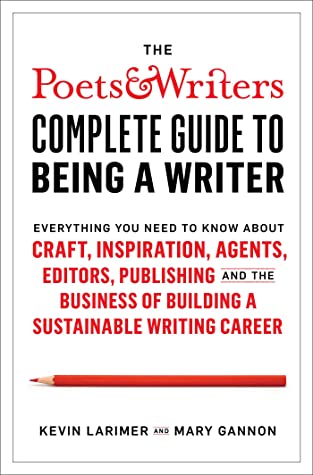As Poets & Writers is my oldest-favouritest magazine about writing, my expectations for this volume were high. When I finally had a copy of it in my hands, the volume so thick and heavy, I was concerned that it would be a reprint of highlights from the periodical, but it’s super satisfying and current, exhaustive and substantive.
Because it’s intended for writers of all experience levels, you can dip in and out (i.e. experienced writers might want to focus on time management, or writers with a completed manuscript might turn directly to the section on agents and representation). But you can also read straight through, moving in a logical progression, from inspiration to craft, from education to publishing, from book deals to publicity and promotion.
There are essays interspersed, contributed by noteworthy and talented writers, on each key topic as well as additional pieces which recommend books for further reading. There is also a section of short chapters dedicated to some big-picture themes (money, time, happiness, family, respect, and the law), which are intended to be thought-provoking and clever. There’s one, for instance, by Charles Yu on the subject of the “Inner Writer”, which is presented as an interview and it’s hilarious.
The Poets & Writers Guide aspires to go the distance. Many books about writing consider the question of goals, for instance, but here the discussion is broken down into Educational Goals, Writing Goals, Publishing Goals, Financial Goals, Higher Goals. Each topic is considered in some detail, so that distinctions are clear, with enough information to invite personal reflection: concise and directed.
There are also textboxes with salient quotations (and throughout the chapters) that would make this a good volume for browsing too. Maybe you are seeking a temporary escape, rather than a dedicated project. This Annie Proulx quotation is one of my favourites: “You should write because you love the shape of stories and sentences and the creation of different words on a page. Writing comes from reading, and reading is the finest teacher of how to write.”
Action Items, advice presented in circles apart from the text, are also browse-worthy and eye-catching. There are, for example, suggestions to visit pw.org/writers for recommendations (about movies, music, books, plays, activities, and philosophies, including “The Time is Now” newsletter—one of my favourites—although their website services are also considered in detail in an appendix). And #49 suggests that you count your rejections. “Note how they represent just one person’s opinion or judgement.”
For many years, Poets & Writers has been an excellent source of ideas and information from diverse authors and industry professionals. The gritty details here are useful, like the Valuing Your Time worksheet (courtesy of Amy Smith with contributions from Andrew Simonet and Aaron Lansman), the Submission Tracker sheet, a Publication Checklist, and a list of Eighty-four Agents Active on Twitter.
But just as helpful is the undercurrent of respectful and hopeful discourse. For a solitary writer (and many of us are more isolated than usual, with COVID restrictions in place to protect vulnerable individuals), the dimensions of this volume (literal and figurative) work to create a small community between two pages. This quotation by Luis Alberto Urrea is so encouraging and powerful: “Writing is on your side. Writing, story, poem, words, they need you if they are to survive. You are part of the life support system of story.”
In a similar vein, I appreciate the note of generosity and optimism, on which the book ends. Some might think it’s mawkish or insincere, but in a sector characterized more by rejection than acceptance, I receive it at face value, with gratitude: “Thank you for being a writer. Your writing is important. It is creative, generative, and the world needs more of it. We wish you the very best of luck with your writing and publishing. And now that we’re at the end, it’s time to get started. The end is just the beginning.”
Top-notch stuff for writers.
Kevin Larimer and Mary Gannon. The Poets & Writers Complete Guide to Being a Writer. New York: Simon & Schuster—Avid Reader Press, 2020.

